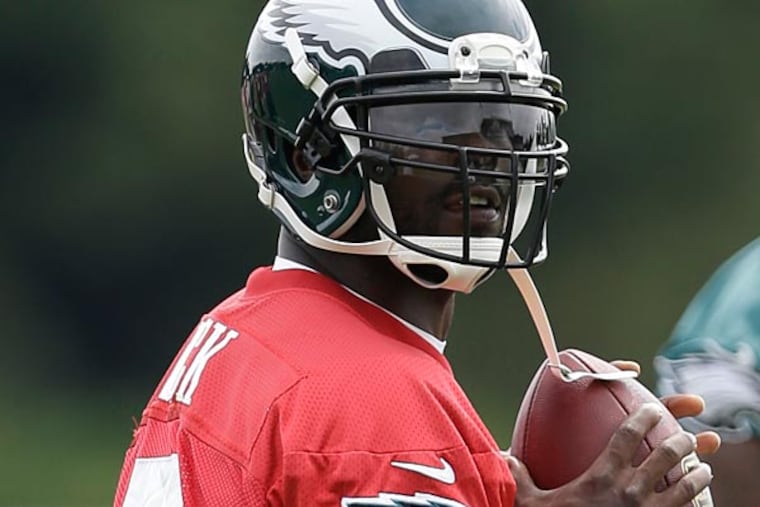Kelly's simplified system helping Vick excel
Michael Vick said that Chip Kelly has helped him fall in love with football again. Melodrama aside, and however premature it may be to proclaim Kelly's reclamation project a success, Vick has looked as comfortable in the pocket through two preseason games as he did during the halcyon days of 2010.

Michael Vick said that Chip Kelly has helped him fall in love with football again.
Melodrama aside, and however premature it may be to proclaim Kelly's reclamation project a success, Vick has looked as comfortable in the pocket through two preseason games as he did during the halcyon days of 2010.
Vick's statement was probably just an emotional response to nearing the finish line ahead of Nick Foles in the Eagles' quarterback competition. But the sentiment seemed sincere after Thursday night's preseason victory over the Panthers.
He has played well.
The main reason? One word: simplification.
It's the same explanation that could be given for Foles' solid start. Kelly isn't dumbing down the position. He's just streamlining the quarterback's responsibilities in running his up-tempo offense.
The play calls are shorter - one word in many instances - the pre-snap reading of defenses less complicated, and the options at the snap requiring less time in the pocket.
"It's not so much getting up to the line, figuring out what the defense is doing, reading that, and correcting things," center Jason Kelce said. "A lot of it is just getting up to the ball and knowing what your assignment is."
Kelly can have his quarterbacks call plays with one word because within certain plays there are multiple run-pass options. The Eagles could line up in the same formation five times in a row and five different players could get the ball - six times and six players if the quarterback keeps the ball and runs.
These "packaged" or "combination" plays, as described by Chris Brown of Grantland.com, have become prevalent at the college and high school level and are seeping into the NFL. Kelly has been at the forefront and has already introduced a number of packaged formations.
The multiple run-pass options reduce the quarterback's pre-snap reads, making them as simple as arithmetic. If the defense has only five players in the box, then the offense line has even numbers and the quarterback should hand the ball off to the "unaccounted for" running back.
If six are in the box, the quarterback has the option to hand off, keep the ball, and run or pass, depending upon the look of the secondary. If an unblocked defender - typically a defensive end or outside linebacker - goes for the quarterback, the ball should in most cases be handed off. If he goes for the ballcarrier, then the quarterback should run.
If there are seven defenders in the box, then the quarterback should throw, typically a quick-hitter. Add in the up-tempo, and the probability that a defense will at some point have the wrong personnel on the field, and it's a dangerous combination.
"The whole thing is designed to really take what the defense is giving you. It's pretty clear-cut for the most part usually what [Vick] should do with the ball," Kelce said. "It's pretty simple and that's something this offense has to be with the tempo it runs at.
"You can't make this whole, complex ordeal out there. You just have to go with the play and trust that it's going to be the right one, and if it's not, we're going to come at you two, three seconds later with another one."
The packaged plays allow for the offense to be the aggressor and to impose its will upon a defense. The Eagles, pre-Kelly, had some packaged plays, but much of what Vick did pre-snap the previous two seasons required him to react to the defensive personnel and formation.
When Andy Reid hired Howard Mudd as his offensive line coach before the 2011 season, it altered Vick's responsibilities pre-snap. Reid, Mudd, and offensive coordinator Marty Mornhinweg weren't burdening Vick with Peyton Manning-type accountability, but he did have more to do with calling out protections.
Kelly's packaged and read-option plays are just one segment of his playbook. There are plenty of plays with pro passing concepts and longer receiver routes. For whatever the reason, Vick has run more of these than Foles. But he no longer has ultimate responsibility for locating the middle linebacker, for instance. Kelce does.
While Kelly's packaged plays require a quarterback to run, it is hardly ever the first option. And because the first options require quick decision-making, there should be little reason for Vick to hold onto the ball too long, which in the past sometimes led to unnecessary scrambling.
Vick, if he wins the starting job, won't also be asked to drop back an inordinate amount as he was under Reid. Kelly won't likely have the 50-50 run-pass ratio he had at Oregon. But he will have more balance than Reid.
Kelly's ratio when the first team played in the first two games was 40-60.
The Eagles offense has gotten off to a promising start, but defenses have yet to game-plan for Kelly's scheme. Vick has hardly seen any blitzes. The game's best defensive coordinators are cooking up ways to stop what's already been put on tape.
But it's the simplicity of Kelly's innovation that seemingly makes it so difficult to contain.
Click here for complete coverage of Philadelphia Eagles training camp.